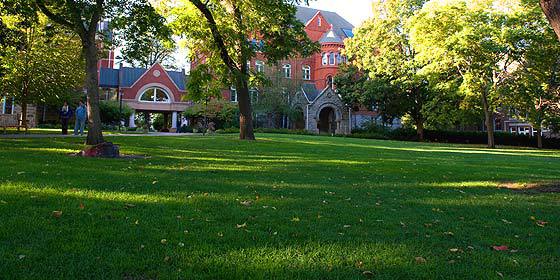Introduction
In the 135 years since its founding, Macalester has come a long way from its Scottish roots. Affectionately nicknamed “Mac,” Macalester seeks to educate thoughtful and responsible global citizens by integrating the traditional values of an academically excellent small liberal arts college with an emphasis on internationalism and civic engagement.
Convincing Mac students of the importance of internationalism and civic engagement is simple—a visit to campus makes this instantly clear. Outside of Old Main and Carnegie Hall, you will see students continuing classroom discussions about international economics with their professors. At the Campus Center, you will likely overhear students arguing about emerging U.S. policies in English and many other languages. On the sidewalk leading from the DeWitt Wallace Library to the Olin-Rice science complex, you will see colorful messages chalked by students about social/political rallies and student organization meetings. In the student newspaper, The Mac Weekly, you will read convincing but conflicting columns expressing opinions about proposed Macalester administrative decisions. At the Civic Engagement Center, you might hear stories of a Mac student inspiring an immigrant child to take her studies seriously so that she might one day attend the college of her mentor. If you stay up past midnight, you might find a group of first-year Genetics students in “The Link” between the Library and Old Main working feverishly to finish a lab report for the next morning. However, Macalester is not just a constant barrage of academic and sociopolitical engagement. In fact, you are just as likely to hear students outside of Old Main discussing the outcome of last night’s soccer game (Mac won by a landslide, of course). Outside of the Campus center, you might hear Jordanian and African students planning a trip to the nearby Mall of America. Chalked messages around campus might advertise the coming Trads and Sirens concert, where students line up outside of the concert hall hoping to get a seat at the popular a cappella show. Or, you might be lucky enough to catch the biannual Mock Weekly, where Mac Weekly writers parody their normally serious journalism.
In the Civic Engagement Center, you might hear a student bragging about this year’s massive yield at the community garden where they volunteer. And, if you visit the campus center just before midnight, you will find chatting students ordering chicken strips and smoothies during a late-night study break.
Late one Saturday morning, a few weeks after arriving at Macalester, I awoke to the distant sound of song. It wasn’t long before I realized that the song was Mac’s fight song ‘Scotland the Brave’ played on our official instrument, the bagpipe. At the time, I knew the song only as a tune, but soon I was ‘loudly and proudly calling Scotland the brave’ with my fellow Fighting Scots at any and every opportunity. I still regret not taking advantage of the free bagpipe lessons that Mac offers to any interested student so that I might have been able to make Macalester proud with my own piped rendition of ‘Scotland the Brave.’
Because of its small size and location in a large city, Mac successfully combines the intimacy of a top-tier small liberal arts college with the excitement, engagement, and opportunities of a large metropolitan environment in a way that few other top liberal arts colleges can. Admittedly, Macalester’s brand of liberal arts education is not for everyone. However, if you like the sound of a college where academics, internationalism, and civic engagement collide in the everyday life of students, then Macalester just might be the place for you.
Macalester College is an academically distinguished small liberal arts college located in a friendly yet interesting neighborhood in St. Paul, one of Minnesota’s Twin Cities. The combination of urban location, academic excellence, internationalism, and civic engagement make Mac unique among the top liberal arts colleges in the nation.
Macalester’s ideal environment, outstanding facilities and professors, and exceptional and engaged students create a vibrant milieu where the lines of classwork, community service, research, and play often blur. Although the resources and opportunities available at Mac would make any college great, it is the student body that makes Macalester truly exceptional.
Mac students (and alumni) recognize the value of immersion in a traditional small liberal arts setting. They are deeply concerned with the affairs of their college, nation, and world, and they are committed to stewarding their college, countries, and continents, into a more promising tomorrow. Who knows that such a great college exists in the middle of St. Paul, Minnesota? Lots of people know, including other liberal arts college students and professors, as well as admissions officers at top medical, law, and graduate schools who enthusiastically admit so many Mac graduates. The thousands of alumni who are leaders in academia, government, medicine, law, business, and nonprofit organizations in every major city worldwide know, too. Undoubtedly, a Mac education is the ultimate preparation for success in graduate studies and any number of careers. But more importantly, Mac is an environment of life-altering enlightenment, life-changing experiences, and lifelong friendships.


